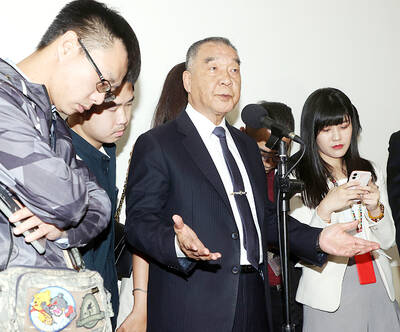Letters mailed to Lienchiang County, which includes the island of Matsu, often go astray. The reason: China also has a Lienchiang County, which is just a few kilometers from Taiwan's.
The "small three links," initiated in January 2001, allow trade, mail and people to cross the small stretch of water between Taiwan's Kinmen and Lienchiang counties and China's Fujian Province.
The new links between the two government agencies with the name Lienchiang County sometimes leave the mailmen baffled.
To end to the confusion, the Lienchiang County Government under Taiwan's control recently proposed surveying its residents on whether the county's name should be changed to Matsu, a name more familiar to the public.
"Ever since we started implementing the `small three links,' cases of mail being misdelivered -- because of confusion between my county and that of China's -- are frequent," said Lienchiang County Commissioner Chen Hsueh-sheng (
The confusion is a legacy of the Chinese civil war. In 1949, the retreating KMT forces took control of the province of Taiwan and also of Kinmen and Matsu, which are part of Fujian Province.
All of Kinmen County came under the KMT's control, but only part of Lienchiang County.
The opening of direct mail links between the two sides has now brought the situation to a head, Chen said.
"I personally have no specific preference as to whether the county's name should stay as Lienchiang or be changed to Matsu," said Chen, who is a member of the PFP. "The proposal is suggested purely to put an end to all the arguments over the county's name."
Aside from problems of missing mail, Chen said that many locals advocated the name change because Matsu is a more commonly used name.
Most of people in Taiwan know the 19 islets that make up Taiwan-controlled Lienchiang County as Matsu rather than by its official name.
"People who wish to have the county's name changed to Matsu said that Matsu was a name that's more well-known and recognizable to outsiders and has a higher profile in the international community," Chen said.
Chen, however, also noted that there were some locals who opposed the name change because it smacked of the independence stance held by the DPP government.
"Some people are concerned that to change the county's name would seem to support former president Lee Teng-hui's (
Chen was referring to comments by Lee that called on Taiwanese to forge a new Constitution and change the nation's name from the Republic of China to Taiwan.
"Some, who want to uphold the historical name of Lienchiang, regard any change to the county's name as a precursor to Taiwan's independence," Chen said.
The commissioner also said that because the county has only 9,000 residents, some feared that pushing for the name change would give central government politicians an excuse to abrogate Lienchiang's status as a county.
"Given all these various opinions on whether the county should change its name, we hope a majority stance can be ascertained through a survey, thereby ending the arguments," Chen said.
The county government has hired a polling company to carry out the survey, he said.
"The firm has just finished a series of explanatory meetings around the islands on this matter," Chen said. "The survey is likely to be held no later than June."
He said the survey would then be distributed to all households.
"If 70 to 80 percent of the people agree to have the county's name changed, then the county government will go ahead and submit the proposal to the county council," Chen said.
"If the county council passes the proposal, then it will take the issue to the Ministry of the Interior to begin the procedure to change the name," he said.
While this procedure is mandated in the Law on Local Government Systems (地方制度法), Lienchiang's move would set a precedent.
"So far, no local government has made such a request," said Lin Mei-chu (

ROLLER-COASTER RIDE: More than five earthquakes ranging from magnitude 4.4 to 5.5 on the Richter scale shook eastern Taiwan in rapid succession yesterday afternoon Back-to-back weather fronts are forecast to hit Taiwan this week, resulting in rain across the nation in the coming days, the Central Weather Administration said yesterday, as it also warned residents in mountainous regions to be wary of landslides and rockfalls. As the first front approached, sporadic rainfall began in central and northern parts of Taiwan yesterday, the agency said, adding that rain is forecast to intensify in those regions today, while brief showers would also affect other parts of the nation. A second weather system is forecast to arrive on Thursday, bringing additional rain to the whole nation until Sunday, it

LANDSLIDES POSSIBLE: The agency advised the public to avoid visiting mountainous regions due to more expected aftershocks and rainfall from a series of weather fronts A series of earthquakes over the past few days were likely aftershocks of the April 3 earthquake in Hualien County, with further aftershocks to be expected for up to a year, the Central Weather Administration (CWA) said yesterday. Based on the nation’s experience after the quake on Sept. 21, 1999, more aftershocks are possible over the next six months to a year, the agency said. A total of 103 earthquakes of magnitude 4 on the local magnitude scale or higher hit Hualien County from 5:08pm on Monday to 10:27am yesterday, with 27 of them exceeding magnitude 5. They included two, of magnitude

A total of 41 US military personnel were stationed in Taiwan as of December last year, a US congressional report said on Friday last week ahead of Tuesday’s passage of an aid package that included US$8 billion for Taiwan. The Congressional Research Service in a report titled Taiwan Defense Issues for Congress said that according to the US Department of Defense’s Defense Manpower Data Center, 41 US military personnel were assigned for duty in Taiwan. Although the normalization of relations with the People’s Republic of China (PRC) in 1979 included a vow to withdraw a military presence from Taiwan, “observers have indicated

The navy next month is expected to commission into service two more domestically built Tuo Chiang-class stealth missile corvettes, a source said yesterday. The Hsu Chiang (旭江, PGG-621) and the Wu Chiang (武江, PGG-623) would be officially commissioned in a ceremony early next month, the source said, speaking on condition of anonymity. The corvettes, launched in February and June last year respectively, were delivered to the navy in February. They are the third and fourth Tuo Chiang-class stealth missile corvettes to be produced. The Tuo Chiang-class corvette is a domestically designed and manufactured class of fast and stealthy multipurpose corvette built for the